PAGE-TURNERS
By Eric C. Forbes
 CONTRARY TO POPULAR BELIEF, excellent first novels and short-story collections are still being written and published today. However, sadly, most of them tend to get lost in the pile or submerged in the chaotic minefield of modern bookselling, especially in a commercial climate that tends to promote established writers only.
CONTRARY TO POPULAR BELIEF, excellent first novels and short-story collections are still being written and published today. However, sadly, most of them tend to get lost in the pile or submerged in the chaotic minefield of modern bookselling, especially in a commercial climate that tends to promote established writers only.What does one look for in a good writer? A delight in words and language is an absolute must. There must unquestionably be humanity in the way the story is told and unfolds. Originality is a definite criterion, not forgetting a strong narrative to push the story forward.
I get excited always whenever I discover a new book by a writer doing wonderful things with language. The fiction that interests me is one that is ambitious for the form it champions, and passionately in love with language and its acrobatics, conjuring images, sounds, smells, colours and feelings. And characters, of course, characters you believe in and care about; without engaging characters, fiction falls limp. Here we will look at several books where the writers demonstrate most of these essential qualities that make their books stand out from the rest.


 Diane Setterfield’s The Thirteenth Tale (2006) is one of the biggest fiction débuts of 2006. This big, sprawling novel is about an ailing reclusive famous novelist who decides to recount the events of her life to the young woman whom she has chosen to be her official biographer; there are family secrets aplenty and the magic of books and storytelling. We can only be free if we confront our inner demons and exorcise the ghosts that haunt us. With this novel, Setterfield delivers the kind of yarn that keeps you turning the pages at an unflagging pace, the kind you can spend the weekend holed up with and put down feeling as though you have woken up from a deep and wonderful spell. If you love books and the reading and writing life, you will find this novel emotionally compelling.
Diane Setterfield’s The Thirteenth Tale (2006) is one of the biggest fiction débuts of 2006. This big, sprawling novel is about an ailing reclusive famous novelist who decides to recount the events of her life to the young woman whom she has chosen to be her official biographer; there are family secrets aplenty and the magic of books and storytelling. We can only be free if we confront our inner demons and exorcise the ghosts that haunt us. With this novel, Setterfield delivers the kind of yarn that keeps you turning the pages at an unflagging pace, the kind you can spend the weekend holed up with and put down feeling as though you have woken up from a deep and wonderful spell. If you love books and the reading and writing life, you will find this novel emotionally compelling.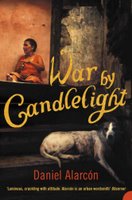 There is a new writer in town and his début short-story collection is amazing. And his name is Daniel Alarcón; his story collection, War by Candlelight (2005). In spare, incisive prose, and with much honesty in the telling, he weaves his magic, creating a kaleidoscope of nine edgy stories set mostly in Peru, evoking the beauty and sadness of a vibrant land ravaged by politics and strife.
There is a new writer in town and his début short-story collection is amazing. And his name is Daniel Alarcón; his story collection, War by Candlelight (2005). In spare, incisive prose, and with much honesty in the telling, he weaves his magic, creating a kaleidoscope of nine edgy stories set mostly in Peru, evoking the beauty and sadness of a vibrant land ravaged by politics and strife. Jim Lynch’s début novel, The Highest Tide (2005), is one of my favourite novels of 2005. Set against the tidal flats of Puget Sound in the Pacific Northwest state of Washington, I love it especially for its taut, lyrical prose and gripping narrative power, spirituality and the wonderful character of Miles O’Malley, the introverted 13-year-old narrator, protagonist and voice of this sad yet hauntingly funny story of growing up. Lynch has an excellent feel for landscape and in his hands, the beauty and grandeur of the Pacific Northwest come alive with a power that is simultaneously raw and wondrous.
Jim Lynch’s début novel, The Highest Tide (2005), is one of my favourite novels of 2005. Set against the tidal flats of Puget Sound in the Pacific Northwest state of Washington, I love it especially for its taut, lyrical prose and gripping narrative power, spirituality and the wonderful character of Miles O’Malley, the introverted 13-year-old narrator, protagonist and voice of this sad yet hauntingly funny story of growing up. Lynch has an excellent feel for landscape and in his hands, the beauty and grandeur of the Pacific Northwest come alive with a power that is simultaneously raw and wondrous. Moscow-born début novelist Olga Grushin’s The Dream Life of Sukhanov (2006) portrays the compromises of a middle-aged man and his eventual realisation. We are shaped by the choices (“choices that sometimes ambush a man so unfairly, without a moment’s warning, and wresting from him an almost instinctive reaction, in the space of a mere minute change the rest of his life”) we make in our lives and made to conform to society’s expectations. Her prose is gracefully descriptive and her characters are well fleshed out.
Moscow-born début novelist Olga Grushin’s The Dream Life of Sukhanov (2006) portrays the compromises of a middle-aged man and his eventual realisation. We are shaped by the choices (“choices that sometimes ambush a man so unfairly, without a moment’s warning, and wresting from him an almost instinctive reaction, in the space of a mere minute change the rest of his life”) we make in our lives and made to conform to society’s expectations. Her prose is gracefully descriptive and her characters are well fleshed out. There’s a poetic, new voice coming out of the Big Apple, one that belongs to Dave King, a New York-based, cab-driving painter and poet. In his assured début, The Ha-Ha (2005), a novel concerned with the fragility of the human psyche and with what it means to be a human being, King makes audible the voice of a tortured man who cannot speak, read or write after a near-fatal head injury sustained in the war in Vietnam—though what you see can be deceiving. He has a spare, taut style that serves to heighten the emotional impact of the story’s celebration of the resilience of the human spirit, resulting in storytelling that is elegant and emotionally engaging. Without resorting to clichés or sentimentality and with a lightness of touch bordering on the comic, and through internal monologue imbued with narrative grace and emotional insight, King has managed to create in Howie Kapostash a protagonist that we care about and root for, one who will strike a resonant chord in us. By peopling his story with characters whose ordinary, everyday lives are tempered with truth, he has imbued in his narrative a subtle dignity and compassion.
There’s a poetic, new voice coming out of the Big Apple, one that belongs to Dave King, a New York-based, cab-driving painter and poet. In his assured début, The Ha-Ha (2005), a novel concerned with the fragility of the human psyche and with what it means to be a human being, King makes audible the voice of a tortured man who cannot speak, read or write after a near-fatal head injury sustained in the war in Vietnam—though what you see can be deceiving. He has a spare, taut style that serves to heighten the emotional impact of the story’s celebration of the resilience of the human spirit, resulting in storytelling that is elegant and emotionally engaging. Without resorting to clichés or sentimentality and with a lightness of touch bordering on the comic, and through internal monologue imbued with narrative grace and emotional insight, King has managed to create in Howie Kapostash a protagonist that we care about and root for, one who will strike a resonant chord in us. By peopling his story with characters whose ordinary, everyday lives are tempered with truth, he has imbued in his narrative a subtle dignity and compassion. Ireland-born Patrick O’Keeffe’s The Hill Road (2005) is an evocative début collection of four novella-length Irish stories on love and abandonment, death, unfulfilled yearnings, opportunities lost, greed and the difficulty of forgiveness, set against the timeless and beguiling rural Irish landscape, isolated in a cloistered world of its own. With much skill and dexterity and a lyrical prose style verging on poetry, O’Keeffe captures not only the elements and nuances of the hauntingly beautiful Irish countryside but the ordinariness of lives that people this landscape as well.
Ireland-born Patrick O’Keeffe’s The Hill Road (2005) is an evocative début collection of four novella-length Irish stories on love and abandonment, death, unfulfilled yearnings, opportunities lost, greed and the difficulty of forgiveness, set against the timeless and beguiling rural Irish landscape, isolated in a cloistered world of its own. With much skill and dexterity and a lyrical prose style verging on poetry, O’Keeffe captures not only the elements and nuances of the hauntingly beautiful Irish countryside but the ordinariness of lives that people this landscape as well.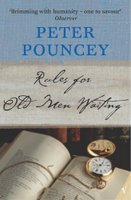 Another first novel which I cannot recommend highly enough is Peter Pouncey’s Rules for Old Men Waiting (2005), the story of a dying old man who is determined to complete the war story he has been writing over the years. Pouncey has written a taut, elegiac first novel that has all the ingredients that constitute a compelling read: humanity, poignancy, emotional weight and intellectual vigour.
Another first novel which I cannot recommend highly enough is Peter Pouncey’s Rules for Old Men Waiting (2005), the story of a dying old man who is determined to complete the war story he has been writing over the years. Pouncey has written a taut, elegiac first novel that has all the ingredients that constitute a compelling read: humanity, poignancy, emotional weight and intellectual vigour.
 Another new voice making splashes all over the place is Jane Harris’s The Observations (2006), an assured first novel made all the more entertaining by the plot twists in a Victorian setting and the compelling voice of its protagonist, a young Irish maid and her thoughts on the strange goings-on in a mansion that has seen better days in provincial Scotland.
Another new voice making splashes all over the place is Jane Harris’s The Observations (2006), an assured first novel made all the more entertaining by the plot twists in a Victorian setting and the compelling voice of its protagonist, a young Irish maid and her thoughts on the strange goings-on in a mansion that has seen better days in provincial Scotland.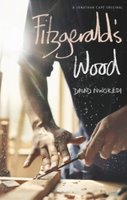 David Nwokedi’s Fitzgerald’s Wood (2005) heralds the arrival of an original new voice laced with humour and infused with poignancy. By peopling his narrative with many engaging characters and exploring many of the familiar themes of the conventional coming-of-age story, Nwokedi has crafted an intimate and heartfelt novel about a mixed-race boy with an identity crisis and his voyage of self-discovery.
David Nwokedi’s Fitzgerald’s Wood (2005) heralds the arrival of an original new voice laced with humour and infused with poignancy. By peopling his narrative with many engaging characters and exploring many of the familiar themes of the conventional coming-of-age story, Nwokedi has crafted an intimate and heartfelt novel about a mixed-race boy with an identity crisis and his voyage of self-discovery. Another first novel worth exploring is Malaysia’s literary pride Tash Aw’s The Harmony Silk Factory (2005), a sprawling, richly woven World War II saga set in the Kinta Valley of 1940s Malaya, a crucial period in Malayan history. A colourful, emotionally engaging and gripping story told in lucid, uncluttered prose through a patchwork of narrative strands, The Harmony Silk Factory is an engrossing portrait of the mysterious antihero, Johnny Lim, an illiterate tin miner turned textile tycoon told in three spare, interlinked narrative strands dissecting Lim’s psyche and his moral ambiguity. What a pleasure it is to read such an accomplished and promising début! Aw has managed to pull off a remarkable feat of the imagination with this tangled tale that displays intermittent flashes of luminosity.
Another first novel worth exploring is Malaysia’s literary pride Tash Aw’s The Harmony Silk Factory (2005), a sprawling, richly woven World War II saga set in the Kinta Valley of 1940s Malaya, a crucial period in Malayan history. A colourful, emotionally engaging and gripping story told in lucid, uncluttered prose through a patchwork of narrative strands, The Harmony Silk Factory is an engrossing portrait of the mysterious antihero, Johnny Lim, an illiterate tin miner turned textile tycoon told in three spare, interlinked narrative strands dissecting Lim’s psyche and his moral ambiguity. What a pleasure it is to read such an accomplished and promising début! Aw has managed to pull off a remarkable feat of the imagination with this tangled tale that displays intermittent flashes of luminosity.
 I’m also really excited about Louise Dean’s ambitious new novel, This Human Season (2005), a story set against the backdrop of Thatcher-era Belfast in the bitter autumn of 1979 before the hunger strikes at the notorious Long Kesh prison. With this sophomore effort, she moves to more ambitious ground compared to her critically-acclaimed début, Becoming Strangers (2004), a tragicomic meditation on ordinary lives. In unpretentious and effortlessly delicate prose, she humanises the Northern Irish Troubles by dissecting her characters with eloquent, dispassionate attention to such minutiae as the Northern Irish lilt and the bleakness of poverty-stricken lives. And amidst all the “blood, shit and tears,” she has humour and humanity in all the right places. And the grim, rain-soaked streets of Belfast are finely evoked. By creating a narrative that pulls the historical facts together into a compelling tale, This Human Season is both a challenge and a pleasure to read. She proved herself a writer of distinction with her first novel; with her second, her place in British fiction is confirmed.
I’m also really excited about Louise Dean’s ambitious new novel, This Human Season (2005), a story set against the backdrop of Thatcher-era Belfast in the bitter autumn of 1979 before the hunger strikes at the notorious Long Kesh prison. With this sophomore effort, she moves to more ambitious ground compared to her critically-acclaimed début, Becoming Strangers (2004), a tragicomic meditation on ordinary lives. In unpretentious and effortlessly delicate prose, she humanises the Northern Irish Troubles by dissecting her characters with eloquent, dispassionate attention to such minutiae as the Northern Irish lilt and the bleakness of poverty-stricken lives. And amidst all the “blood, shit and tears,” she has humour and humanity in all the right places. And the grim, rain-soaked streets of Belfast are finely evoked. By creating a narrative that pulls the historical facts together into a compelling tale, This Human Season is both a challenge and a pleasure to read. She proved herself a writer of distinction with her first novel; with her second, her place in British fiction is confirmed. There are many wonderful novels out there, but it is only occasionally that one comes along with a voice so stridently pristine and seductive that you simply tumble willingly into its thrall. Bombay-born Siddharth Dhanvant Shanghvi’s The Last Song of Dusk (2004), a sprawling family saga set in turn-of-the-century India and told in luscious, sensuous prose, is a promising début. It has a strong narrative arc and tinges of magic realism; it is amazing how well Shangvi handles the long time spans without ever losing the narrative pulse of the novel.
There are many wonderful novels out there, but it is only occasionally that one comes along with a voice so stridently pristine and seductive that you simply tumble willingly into its thrall. Bombay-born Siddharth Dhanvant Shanghvi’s The Last Song of Dusk (2004), a sprawling family saga set in turn-of-the-century India and told in luscious, sensuous prose, is a promising début. It has a strong narrative arc and tinges of magic realism; it is amazing how well Shangvi handles the long time spans without ever losing the narrative pulse of the novel. Last but not least, Lisa Fugard, the only daughter of acclaimed South African playwright Athol Fugard, explores the moral ambiguities of apartheid in her first novel, Skinner’s Drift (2005); its lack of originality plot-wise is compensated by wonderful writing, lots of human drama, empathetic characters, an insight into South Africa’s past and present, and how forgiveness is sometimes the only means of healing our wounds.
Last but not least, Lisa Fugard, the only daughter of acclaimed South African playwright Athol Fugard, explores the moral ambiguities of apartheid in her first novel, Skinner’s Drift (2005); its lack of originality plot-wise is compensated by wonderful writing, lots of human drama, empathetic characters, an insight into South Africa’s past and present, and how forgiveness is sometimes the only means of healing our wounds.With such a variety of books in our midst, we are spoiled for choice. So, what’s next on your reading list? One of these fictional débuts, perhaps?
Suggested Reading
Years of hard work went into the writing of these recent first novels and short-story collections. The following books exhibit some of the hallmarks of good writing: originality, language, engaging characters, clarity of voice, etc.:
• War by Candlelight (2005) / Daniel Alarcón
• Disobedience (2006) / Naomi Alderman
• Articles of War (2005) / Nick Arvin
• The Harmony Silk Factory (2005) / Tash Aw
• Please Don’t Come Back from the Moon (2005) / Dean Bakopoulos
• Where They Were Missed (2006) / Lucy Caldwell
• The Saffron Kitchen (2006) / Yasmin Crowther
• Becoming Strangers (2004) / Louise Dean
• The Loss of Leon Meed (2005) / Josh Emmons
• 26a (2005) / Diana Evans
• Ancestor Stones (2006) / Aminatta Forna
• Skinner’s Drift (2005) / Lisa Fugard
• The Janissary Tree (2006) / Jason Goodwin
• The Dream Life of Sukhanov (2006) / Olga Grushin
• The Observations (2006) / Jane Harris
• The Ha-Ha (2005) / Dave King
• The Historian (2005) / Elizabeth Kostova
• A Short History of Tractors in Ukrainian (2005) / Marina Lewycka
• A Thousand Years of Good Prayers (2005) / Yiyun Li
• Breaking the Tongue (2004) / Vyvyane Loh
• The Highest Tide (2005) / Jim Lynch
• In the Country of Men (2006) / Hisham Matar
• Fitzgerald’s Wood (2005) / David Nwokedi
• The Hill Road (2005) / Patrick O’Keeffe
• Rules for Old Men Waiting (2005) / Peter Pouncey
• Responsible Men (2005) / Edward Schwarzschild
• The Thirteenth Tale (2006) / Diane Setterfield
• The Last Song of Dusk (2004) / Siddharth Dhanvant Shangvi
• Misfortune (2005) / Wesley Stace
• The Sultan’s Seal (2006) / Jenny White


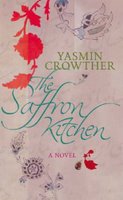


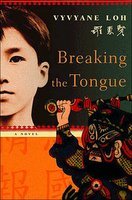





5 Comments:
Hi Eric,
I'm finishing The Historian, just 90 pages left or so. I think so far it can be read about the obsession the topic of vampires seem to become for some writers and critics. What do you think?
Hello Jacobo - Do you read the Spanish version of these novels or do you read the original English version? Just curious to know.
In the case of The Historian, I'm reading the Spanish version. My rule is to read the original English version when available (nowadays it is always thanks to amazon.co.uk), but I'm flexible about that with best sellers and the kind.
Did you miss out If Nobody
Speaks of Remarkable Things by Jon Mcgregor, his 1st novel???? The most remarkable read!!! I'm a fan already, and I also read his current novel So Many Ways to Begin, longlist for the Booker this year.
Hello Leon - No, I did not forget Jon McGregor. I really enjoyed both his novels: So Many Ways to Begin (2006) and If Nobody Speaks of Remarkable Things (2002). I did not include him simply because I wanted to focus on the more recent writers, especially those who made their debuts in 2005 and 2006.
Post a Comment
<< Home